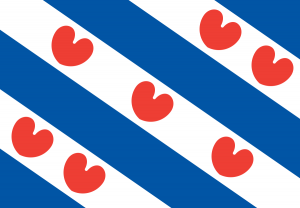Language/Western-frisian/Grammar/How-to-Use-Be
Hi Western Frisian learners! 😊
In this lesson, we are going to learn how to use "be" in the Western Frisian language. Using "be" is very important in constructing sentences, and it is considered as a verb that denotes a state of being, expressing a condition or an attribute.
Finish this lesson and explore these related pages: Basic Sentence Structure & Negation.
Basic Usage of "Be"[edit | edit source]
In the Western Frisian language, "be" (binne in Western Frisian) is used as the present tense form of the verb "to be" and can be used as follows:
| Western Frisian | Pronunciation | English |
|---|---|---|
| Ik ben | [ɪk bɛn] | I am |
| Do bist | [do ˈbɪst] | You are (singular informal) |
| Hy/Sy/It is | [hɛi̯/si/ɪt ɪs] | He/She/It is |
| Wy binne | [wɛi̯ ˈbɪnə] | We are |
| Jim binne | [jɪm binə] | You are (plural informal) |
| Sy binne | [si binə] | They are |
Examples[edit | edit source]
- Person 1: Ik ben een leraar. ([I am a teacher].)
- Person 2: Hy is ook leraar ([He is also a teacher.])
Negation of "Be"[edit | edit source]
In the Western Frisian language, negation is formed by adding negative particle "net" before the verb "be". It can be used as follows:
| Western Frisian | Pronunciation | English |
|---|---|---|
| Ik bin net | [ɪk bɛn nɛt] | I am not |
| Do bist net | [do ˈbɪst nɛt] | You are not (singular informal) |
| Hy/Sy/It is net | [hɛi̯/si/ɪt ɪs nɛt] | He/She/It is not |
| Wy binne net | [wɛi̯ ˈbɪnə nɛt] | We are not |
| Jim binne net | [jɪm binə nɛt] | You are not (plural informal) |
| Sy binne net | [si binə nɛt] | They are not |
Examples[edit | edit source]
- Person 1: Ik bin net slim. ([I am not clever].)
- Person 2: Jim binne net dom. ([You are not stupid.])
Interrogative Forms of "Be"[edit | edit source]
To form questions using "be" in Western Frisian, invert the pronoun and the verb "be" to construct interrogative forms. It can be used as follows:
| Western Frisian | Pronunciation | English |
|---|---|---|
| Bin ik | [bɪn ɪk] | Am I? |
| Bist do | [bɪst do] | Are you? (singular informal) |
| Is hy/sy/it | [ɪs hɛi̯/si/ɪt] | Is he/she/it? |
| Binne wy | [ˈbɪnə wɛi̯] | Are we? |
| Binne jim | [ˈbɪnə jɪm] | Are you? (plural informal) |
| Binne sy | [ˈbɪnə si] | Are they? |
Examples[edit | edit source]
- Person 1: Binne jim Frisysk? ([Are you Frisian?].)
- Person 2: Nee, wy binne Nederlânsk. ([No, we are Dutch.])
Contractions with "Be"[edit | edit source]
In Western Frisian, "be" can be contracted with pronouns in informal settings. Here are some examples:
| Western Frisian | Pronunciation | English |
|---|---|---|
| 'k bin | [k bɪn] | I am |
| bist | [bɪst] | (You) are |
| is | [is] | He/She/It is |
| binne | [ˈbɪnə] | We/They are |
Dialogue[edit | edit source]
Julia is meeting her new friends in Leeuwarden. They are having a conversation about their likes and dislikes.
- Julia: Ik bin fereale ta Frisian kofje ( I am fond of Frisian coffee)
- Henk: Ik bin ek fereale ta Frisian kofje. (I am also fond of Frisian coffee)
- Peter: Ik bin net fereale ta kofje (I am not fond of coffee)
Conclusion[edit | edit source]
In conclusion, in Western Frisian, "be" is an important verb that denotes a state of being, expressing a condition or an attribute. It can be negated and questioned with inversion, and can be contracted with pronouns in informal settings. To improve your Western Frisian Grammar, you can also use the Polyglot Club website. Find native speakers and ask them any questions!
➡ If you have any questions, please ask them in the comments section below.
➡ Feel free to edit this wiki page if you think it can be improved. 😎
Excellent job on conquering this lesson! Consider delving into these related pages: Noun Gender and Plurals & Comparative and Superlative.

